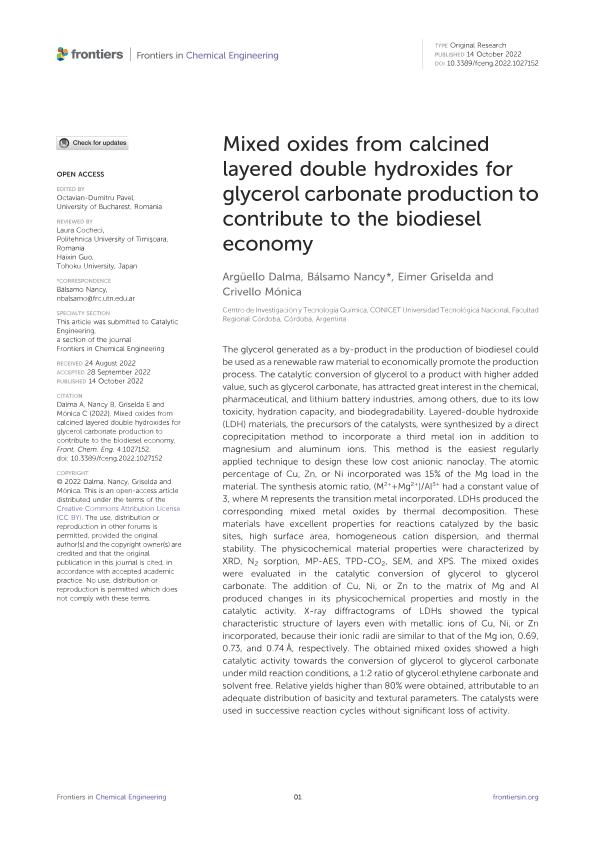Mostrar el registro sencillo del ítem
dc.contributor.author
Argüello, Dalma Sofía

dc.contributor.author
Balsamo, Nancy Florentina

dc.contributor.author
Eimer, Griselda Alejandra

dc.contributor.author
Crivello, Mónica Elsie

dc.date.available
2023-07-12T11:56:25Z
dc.date.issued
2022-10-14
dc.identifier.citation
Argüello, Dalma Sofía; Balsamo, Nancy Florentina; Eimer, Griselda Alejandra; Crivello, Mónica Elsie; Mixed oxides from calcined layered double hydroxides for glycerol carbonate production to contribute to the biodiesel economy; Frontiers Media; Frontiers in Chemical Engineering; 4; 1027152; 14-10-2022; 1-10
dc.identifier.issn
2673-2718
dc.identifier.uri
http://hdl.handle.net/11336/203398
dc.description.abstract
The glycerol generated as a by-product in the production of biodiesel could be used as a renewable rawmaterial to economically promote the production process. The catalytic conversion of glycerol to a product with higher added value, such as glycerol carbonate, has attracted great interest in the chemical, pharmaceutical, and lithium battery industries, among others, due to its low toxicity, hydration capacity, and biodegradability. Layered-double hydroxide (LDH) materials, the precursors of the catalysts, were synthesized by a direct coprecipitation method to incorporate a third metal ion in addition to magnesium and aluminum ions. This method is the easiest regularly applied technique to design these low cost anionic nanoclay. The atomic percentage of Cu, Zn, or Ni incorporated was 15% of the Mg load in the material. The synthesis atomic ratio, (M2++Mg2+)/Al3+ had a constant value of 3, where M represents the transition metal incorporated. LDHs produced the corresponding mixed metal oxides by thermal decomposition. These materials have excellent properties for reactions catalyzed by the basic sites, high surface area, homogeneous cation dispersion, and thermal stability. The physicochemical material properties were characterized byXRD, N2 sorption, MP-AES, TPD-CO2, SEM, and XPS. The mixed oxides were evaluated in the catalytic conversion of glycerol to glycerol carbonate. The addition of Cu, Ni, or Zn to the matrix of Mg and Al produced changes in its physicochemical properties and mostly in the catalytic activity. X-ray diffractograms of LDHs showed the typical characteristic structure of layers even with metallic ions of Cu, Ni, or Zn incorporated, because their ionic radii are similar to that of the Mg ion, 0.69, 0.73, and 0.74 Å, respectively. The obtained mixed oxides showed a high catalytic activity towards the conversion of glycerol to glycerol carbonate under mild reaction conditions, a 1:2 ratio of glycerol:ethylene carbonate and solvent free. Relative yields higher than 80% were obtained, attributable to an adequate distribution of basicity and textural parameters. The catalysts wereused in successive reaction cycles without significant loss of activity.
dc.format
application/pdf
dc.language.iso
eng
dc.publisher
Frontiers Media

dc.rights
info:eu-repo/semantics/openAccess
dc.rights.uri
https://creativecommons.org/licenses/by/2.5/ar/
dc.subject
LAYERED DOUBLE HYDROXIDES
dc.subject
MIXED OXIDES
dc.subject
HETEROGENEOUS CATALYSIS
dc.subject
GLYCEROL
dc.subject
GLYCEROL CARBONATE
dc.subject.classification
Ingeniería de Procesos Químicos

dc.subject.classification
Ingeniería Química

dc.subject.classification
INGENIERÍAS Y TECNOLOGÍAS

dc.title
Mixed oxides from calcined layered double hydroxides for glycerol carbonate production to contribute to the biodiesel economy
dc.type
info:eu-repo/semantics/article
dc.type
info:ar-repo/semantics/artículo
dc.type
info:eu-repo/semantics/publishedVersion
dc.date.updated
2023-07-07T17:31:45Z
dc.journal.volume
4
dc.journal.number
1027152
dc.journal.pagination
1-10
dc.journal.pais
Suiza

dc.journal.ciudad
Lausanne
dc.description.fil
Fil: Argüello, Dalma Sofía. Consejo Nacional de Investigaciones Científicas y Técnicas. Centro Científico Tecnológico Conicet - Córdoba. Centro de Investigación y Tecnología Química. Universidad Tecnológica Nacional. Facultad Regional Córdoba. Centro de Investigación y Tecnología Química; Argentina
dc.description.fil
Fil: Balsamo, Nancy Florentina. Consejo Nacional de Investigaciones Científicas y Técnicas. Centro Científico Tecnológico Conicet - Córdoba. Centro de Investigación y Tecnología Química. Universidad Tecnológica Nacional. Facultad Regional Córdoba. Centro de Investigación y Tecnología Química; Argentina
dc.description.fil
Fil: Eimer, Griselda Alejandra. Consejo Nacional de Investigaciones Científicas y Técnicas. Centro Científico Tecnológico Conicet - Córdoba. Centro de Investigación y Tecnología Química. Universidad Tecnológica Nacional. Facultad Regional Córdoba. Centro de Investigación y Tecnología Química; Argentina
dc.description.fil
Fil: Crivello, Mónica Elsie. Consejo Nacional de Investigaciones Científicas y Técnicas. Centro Científico Tecnológico Conicet - Córdoba. Centro de Investigación y Tecnología Química. Universidad Tecnológica Nacional. Facultad Regional Córdoba. Centro de Investigación y Tecnología Química; Argentina
dc.journal.title
Frontiers in Chemical Engineering
dc.relation.alternativeid
info:eu-repo/semantics/altIdentifier/url/https://www.frontiersin.org/articles/10.3389/fceng.2022.1027152/full
dc.relation.alternativeid
info:eu-repo/semantics/altIdentifier/doi/http://dx.doi.org/ 10.3389/fceng.2022.1027152
Archivos asociados
